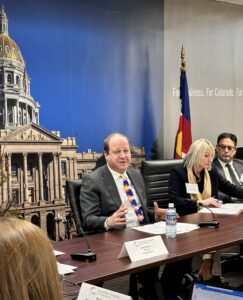Gov. Jared Polis proposed roughly $60 million in new workforce incentives Wednesday as part of his budget plan for the upcoming fiscal year, aimed particularly at expanding apprenticeship programs and increasing ways to upskill workers.
The requests to the Colorado Legislature are a small part of the $43.5 billion budget plan, which includes $18.4 billion in proposed general-fund spending and is highlighted by a $141.2 million allocation to pay off the budget stabilization factor and end 14 years of K-12 funding shortfalls. Other priority items that the Democratic governor laid out in a letter to legislators include $136.7 million in housing investments focused on transit-oriented communities and accessory dwelling units and a $39.6 million crime-prevention package.
But Polis also made a special point in that letter — sent to the elected officials who now will begin debating and changing the plan — of emphasizing the need to invest in workforce development, sometimes with money focused on specific sectors such as infrastructure. Such investments, he said, go hand in hand with proposed boosts to educational funding, such as his suggested $33.4 million to hold college tuition increases below the rate of inflation and the $8 million more that he wants to put toward enrichment in science, technology, engineering and math (STEM) education.
“Colorado’s workers are at the heart of our economy, and right now our state has two available jobs for every Coloradan,” Polis wrote. That’s why we remain committed to connecting all Coloradans to quality and affordable upskilling, training or educational programs that lead to good-paying jobs. This is important for Coloradans supporting themselves and their families, and for strengthening our businesses.”

Gov. Jared Polis speaks to a Colorado Chamber of Commerce board meeting earlier this year about his legislative agenda.
A need for talent development
The proposed investments come after the Legislature put $70 million during the 2023 session to two key programs — one to offer free training for in-demand professions such as construction and nursing and another to give $1,500 scholarships to most 2024 high-school graduates. And they come as workforce shortages have ramped up conversations on how to improve Colorado’s talent-development pipeline, leading to a report last month from the newly formed Education to Employment Alliance on how business and education can do this in partnership.
Polis, a longtime advocate for increasing apprenticeships as a way to create new career pathways for students, proposed creating $30 million in refundable tax credits that provide a defined amount per apprentice to defray the costs of employers hiring them. That would pair with $2 million in grants to help employers without apprenticeship programs to build them out and would include as much as $4 million to support organizations that help to facilitate apprenticeships at private companies, according to a slideshow Polis released.
The governor also proposed adding $5 million to the $85 million Opportunity Now grant program, which seeks proposals from public-private partnerships on how to enhance workforce-development pipelines and which awarded its first $27 million in funding in June. That money specifically would go toward training infrastructure-related workers to meet the demand created by federal grants for highway, electrification, broadband, and other projects, he wrote.
Budget includes money for school programs
And Polis added to that a plan to create $20 million in refundable tax credits to support partnerships between state agencies and private industry that would upskill existing workers. Those would help to meet the demand for skilled workers in sectors such as construction and manufacturing that face critical labor shortages.
Polis also proposed several sources of new funding to help K-12 schools better prepare workers for in-demand jobs — a need expressed by numerous employers in barnstorming meetings organized by the Colorado Chamber of Commerce this year. Those include a pot of $5 million for academic enrichment and work-based learning programs in local schools, $2 million to boost the Colorado Development Incentive Program that funds career development in schools and $800,000 for coming recommendations from a task force studying how to blur the lines between high school, college and workforce training.
In the coming weeks, the governor will formally present to the Joint Budget Committee his proposed plan for the fiscal year that begins on July 1. The JBC then will present a budget bill to the Legislature in mid-March and the General Assembly as a whole will debate it then.
